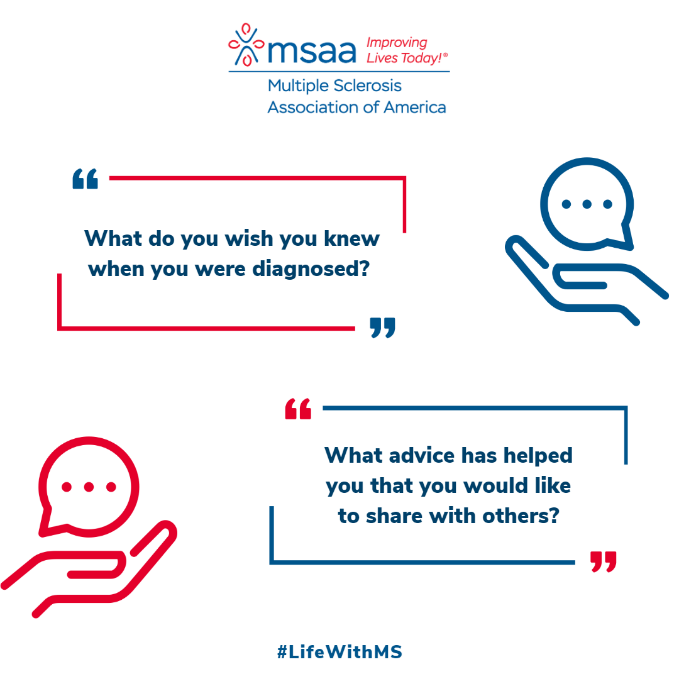During MS Awareness Month, MSAA has been releasing a variety of programs and resources for the MS community. This year, we focused on the theme “Life with MS: Different Stages of the Journey” with programs related to: Pediatric MS, Young Adults with MS, Family Planning and MS, and Aging Well with MS. These topics explore the journey of the MS community and their life with MS from diagnosis and throughout their journeys.
Continue readingTag Archives: ms
Family Planning and MS
Family planning is an important aspect for people with MS, as hormonal changes during pregnancy and postpartum can impact the course of the disease. It is crucial for individuals with MS to discuss their family planning options with their neurologist and obstetrics and gynecology (OB/GYN) to make informed decisions about their reproductive health.
Continue readingBring it on
Having a child with an illness is any parent’s greatest nightmare. MS being an unpredictable and progressive disease can invoke a lot of emotions for the whole family once a diagnosis has been established. Hug your child from time to time and let them know that it is going to be okay. Give them the reassurance that you are by their side no matter what. Be your child’s greatest cheerleader and encourage them to continue with their regular activities to keep them engaged. Practicing physical activities, getting adequate sleep and following healthy diet patterns can have a huge impact on a child’s MS journey.
Continue readingHopes and Goals for the New Year
With each new year, many people set goals and intentions for the best possible future.
Thinking about the new year means a lot of different things to people in the multiple sclerosis (MS) community.
To learn more about this, we reached out on the MultipleSclerosis.net Facebook page. We asked, “What is your biggest hope for your multiple sclerosis journey in 2023?”
The question received more than 300 comments. Here are the themes that emerged.
Continue readingAsk the Expert – Depression
Featuring Barry A. Hendin, MD
MSAA’s Chief Medical Officer
Question: How does psychological therapy, either alone or in conjunction with medication, make a difference for someone with MS who is experiencing depression?
Answer: This question highlights the fact that there is more than one approach to treating psychological problems. Anyone may experience depression, but this symptom is more common in people with MS. Much of this is biologically determined, meaning that depression in MS is often caused by changes in the central nervous system (CNS), but we’re also aware that situational problems may occur in anyone’s life, including those with MS.
Antidepressant medications from a psychiatrist (or other appropriate clinician) can be very helpful for the biological aspects of depression. But for many people, an additional benefit may be derived from psychotherapy or “talk therapy” with a psychologist or counselor. This psychological support can help individuals to develop strategies to navigate complex situational issues.
Beyond these professional interventions, there are several things that people with MS are able to do independently. For many, exercise can reduce depression. For others, mindfulness, yoga, or meditation may be helpful. And for everyone, focusing on the other aspects of wellness, which include maintaining a healthy diet and healthy social relationships, can’t be emphasized enough!
Please note that anxiety may occur along with depression and is also more common in the MS population. Many of the approaches to treating depression are also useful in reducing anxiety, but as with depression, this symptom should be diagnosed by a professional and treated accordingly.
Barry A. Hendin, MD is a neurologist and Director of the Multiple Sclerosis Center of Arizona. He is also Director of the Multiple Sclerosis Clinic at Banner University Medical Center and Clinical Professor of Neurology at the University of Arizona Medical School.
Little Things
By Doug Ankerman
Time management? When one has multiple sclerosis?
Good one!
That’s like asking if you would rather walk on broken glass…or hot coals?
You see, I HAVE the time. I no longer work and my obligations are few, so time is no prob-lemmo. Management, on the other hand, well that’s where MS fudges things up.
Because despite all my pre-planning, organization and visual run-throughs, I am always behind. Or so it seems.
Always longest in the shower. Pokiest to get dressed. Last to the car.
Trying my darndest, MS is the speedbump I struggle stepping over.
Continue readingShaping the MS Experience: Unique MS Journeys
When managing one’s MS, there can be many factors and elements involved in the process. All such journeys are different, and each person’s experience with MS is very unique. This makes it difficult at times to compare and help navigate its course and impacts. Its unpredictable nature can cause challenges in finding ways to help manage symptoms and disease changes. But there are so many different types of support, treatments, and strategies in place nowadays. Experiences can be shaped and influenced greatly.
Support
Continue reading10 Ways To Stay Busy In The Winter
Between the cold weather and COVID, it might be a challenge finding fun ways to stay busy in the winter. There’s no need to stare at your ceiling out of boredom. Staying home can be just as fun and productive as putting real clothes on and going out! These 10 ways to stay busy in the winter will have you saying “paaaar-tay!”

· Call up your friend or a close relative
· Clean out your closet
· Give yourself a manicure
· Read a good book
· TV time!
· Start scrapbooking
· Bake a delicious cake
· Take up knitting
· Have a dance party in your pajamas!
· Virtual Zumba classes
For many people, the mere concept of sitting at home is enough to make you feel like you are swimming in a sea of boredom. But it doesn’t have to be that way! Try out these different ways to stay busy in the winter and see how it works for you!
You might find that you keep the sea of boredom at bay!
ABCs of the MS Diagnostic Process
A – Ask a Neurologist
Is it MS, or is it something else? If you are experiencing numbness and tingling in your body, these symptoms could be caused by MS. On the other hand, there are many illnesses that easily mimic MS symptoms. To help figure out what is going on, the next step is to make an appointment with your primary care physician. If your doctor suspects MS, you’ll probably be referred to a neurologist for a definitive MS diagnosis.
B – Brain MRI
The MRI scans the brain using a computer, radiofrequency stimulator, and a huge magnet. Good news, MRIs do not expose patients to radiation, and helps doctors get a clear picture of what’s happening in the Brain. The MRI is used to assess the size and location of lesions in persons with multiple sclerosis. Contrast enhancement is often used to help to better assess inflammation and determine if MS is present in the Brain.
C – Consider Your Treatment Options
MS can be treated with a variety of effective FDA-Approved drugs. These medications can be recommended for all three types of MS. There are three main goals of MS treatment. Firstly, is to limit MS activity and development. Secondly, is to lessen the severity and duration of a relapse. And lastly, is to treat MS symptoms. All of these medications are typically administered by a doctor who specializes in MS or a neurologist. To download a list of FDA-Approved MS medications, please click here.
Some of the ABCs
Living with MS is a unique and different experience for each person it affects. No two people will have exactly the same symptoms or disease course, but many still find commonalities in their experiences and feelings when it comes to the condition. MS tries to bring a lot of baggage with it, but many find ways to cope and manage the disease in their own way that works for them. This is done with the help and support of healthcare professionals, family, friends, and others in the MS community. As we focus on some of the ABCs of MS this month according to each person’s view of it, I’ve highlighted some factors I’ve seen relate to MS below.
A: Some of the A’s I’ve seen correlate to MS include Acceptance, Adapting, and Adjusting. Hearing a diagnosis of MS brings a period of trying to accept the diagnosis and coming to terms with it. Acceptance is not an easy feat and can take time. It can come in waves and show up again at later points in the disease course too. So, it’s a step that individuals may find themselves faced with multiple times. Finding ways to help accept it can look different and change too and is unique to each person. Adapting and adjusting to some of the changes MS can create is something people find themselves doing often as well. Making changes and modifying things can help maintain balance and expectations. If routines/schedules/tasks need adjusting to help fit your needs better, take time to make these changes so they work for you.
B: B’s associated with MS can include Building and Backup. Building relates to the education and knowledge piece of MS. Building upon information about the disease and continuously learning new facts and resources is an important piece to the process. Continue to build upon your strengths and goals and finding what you enjoy too. Backup refers to the support you put behind you when dealing with MS. Whether it be your own skillsets and strengths, support from others within your circle, education and resources, and health information. It never hurts to have a little backup when needed.
C: The C’s related to MS incorporate Community and Care. Within the MS space there is a great sense of community that many individuals rely and depend on for support. It is vast and has many layers that consist of healthcare teams, MS organizations, peer and familial support, counseling help, and other pieces individuals connect with throughout their MS journey. Community support is a great tool in helping to manage the disease and finding assistance. Care is a crucial piece to the puzzle as well. Finding healthcare, personal, wellness, and emotional care aid is significant in helping cope with the disease and all its factors.
It’s hard to imagine that one disease can have so many differing views of it and be experienced in such vastly different ways, but MS can and does. But no matter how unique each person’s course of it is, there’s still so much to connect and relate to about it. No one is alone in this.



